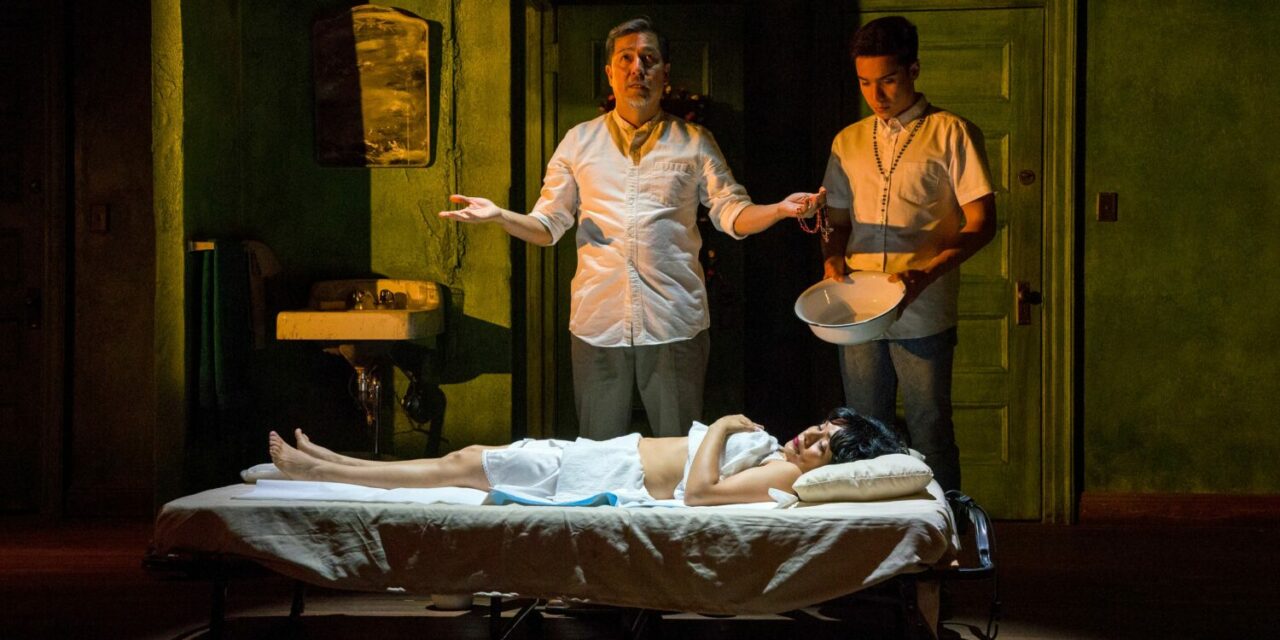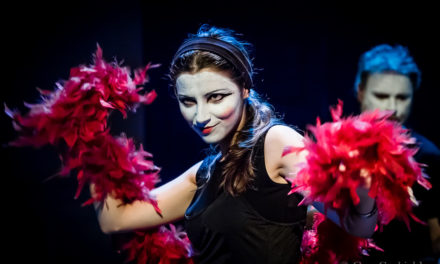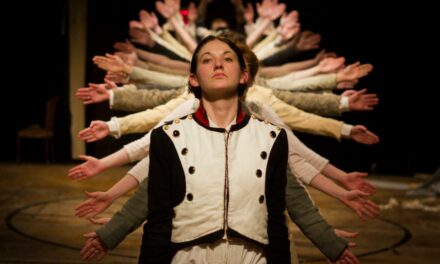Felix Starro, a Ma-Yi Theater Company production playing at Theatre Row, is simultaneously harrowing, clarifying, and exhilarating, exactly like a good therapy session. The eponymous character is an aging faith healer from the Philippines once famed for his “psychic surgeries.” Accompanied and assisted by his grandson who shares his name, he’s trying for one last fantastic run on a trip to San Francisco. Concerned with intergenerational conflict, the plight of immigrants in the United States, and, most of all, charlatanism, this play is, as Emily Nussbaum wrote of The Marvelous Mrs. Maisel, “so far up my alley, it was practically chopping onions in my kitchen.” Oh, and did I mention it’s a musical? With book and lyrics by Jessica Hagedorn and fantastic music by Fabian Obispo, based on Lysley Tenorio’s short story of the same title, Felix Starro is an affecting and inventive exploration into faith, family, performance, and ambition.
Alan Ariano is ravishing as the title character, but actually, it’s unclear which Felix Starro the title refers to. The grandfather is the famous Felix Starro, but the grandson, called Junior and played with an earnest emotional hunger by Nacho Tambunting, is the one navigating the ethical conflict; the short story is from Junior’s perspective. (A literary antecedent is Tolstoy’s Anna Karenina, Anna Karenina being the name of both the adulterous woman and her love child with Count Vronsky.) Felix performs “psychic surgeries” on people who are suffering from physical afflictions but unable to find relief, or afford it, with conventional doctors. For the price of $200, and using a mix of Catholic prayer, esoteric ritual, massage and showmanship, Felix will extract “negativities” from his patients’ bodies. The play takes place in 1985, so that’s about $475 today. “So many unwell Filipino-Americans!” he exclaims mock-incredulously.
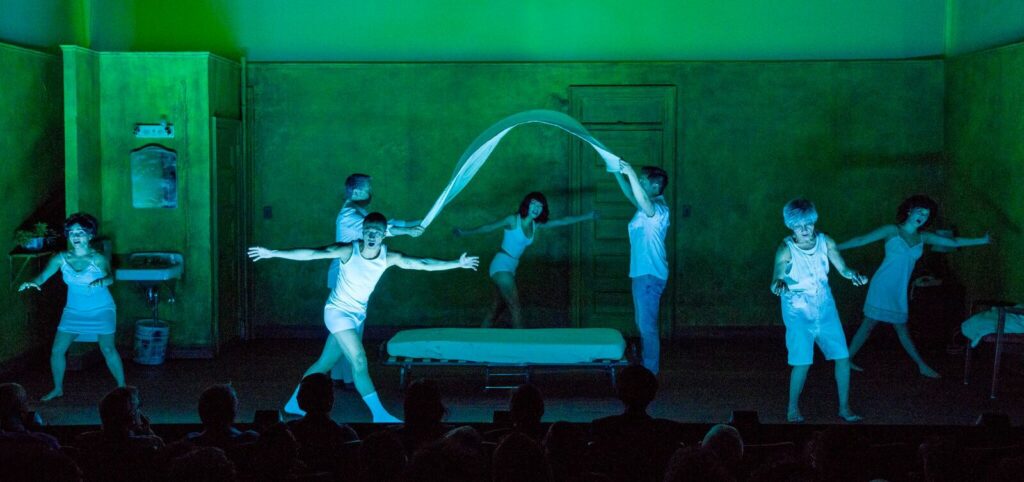
Photo by Richard Termine.
In an essay by Dr. Deirdre de la Cruz, Professor of Philippine History at the University of Michigan helpfully provided in the Felix Starro program, I learned about the rise of psychic surgeries “in the 1970s and early 80s, when the Philippines was in the way of the greatest cheat of all, Ferdinand Marcos […] Psychic surgery theatricalized the politics and violence of the Marcos regime at the same time that it promised relief for sick Filipinos and foreigners alike.” She notes its popularity among American New Agers like Shirley MacLaine, and I remembered a psychic surgery scene from the film Man on the Moon immediately preceding Andy Kaufman’s death. It’s a predatory, exploitative, dishonest practice. But then, so is the wellness industry.
We never see Felix grapple with the ethics of his profession. On the contrary, he seems firmly convinced that he is truly powerful with a gift from God. Like so many successful and dangerous showmen – L. Ron Hubbard, Jim Jones, Trump – it’s hard to tell how much of this stuff Felix actually believes. Certainly, the avowal of faith is one of his most important tools. But Junior, who has long been aware of the mechanics of psychic surgery, is having what amounts to a crisis of faith: in his grandfather’s integrity, and in his own purpose. Ironically, Junior’s desire to remain in the United States sends him seeking the services of somebody else in the imposter industry. Flora Ramirez, the ice-cold Ching Valdes-Aran, sells falsified documents, and she’s another brand of a predator, like Felix Starro crossed with Ursula the Sea Witch. To break free from his deceptive grandfather, Junior would have to assume a new identity and mount a lifelong deception of his own.
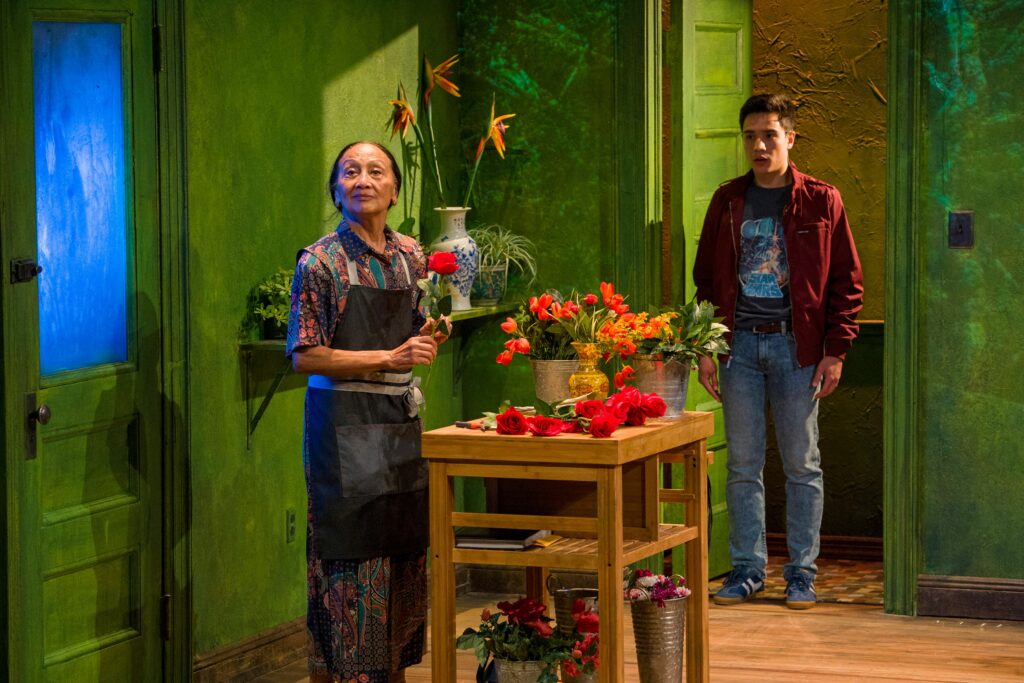
Ching Valdes-Aran as Flora Ramirez and Nacho Tambunting as Junior. Photo by Richard Termine.
The ensemble cast is rounded out by Ryan James Ortega, Francisca Muñoz, Diane Phelan and Caitlin Cisco whose coolness overshadowed her characters’ downtroddenness as she gave me major Jia Tolentino vibes. All the performers except Ariano and Tambunting move in and out of characters including Felix’s former hype team, his desperate patients in San Francisco, and the wretched denizens from Baguio City’s underbelly. The vocal talent of the cast is astonishing, especially Francisca Muñoz in “Tango of Pain.” While some of the lyrics are a bit clunky, the best songs are the ones where a dazzling upbeat tune intentionally distracts from tragic or threatening lyrics. In this group are the numbers “Remember your Promise,” sung by Diane Phelan as Charma, Junior’s girlfriend back home, and “Magic Tricks,” which transports us back to Felix’s glory days, when he wore a sequined tuxedo as the host of the hit tv show Psychic Surgery Phenomena.
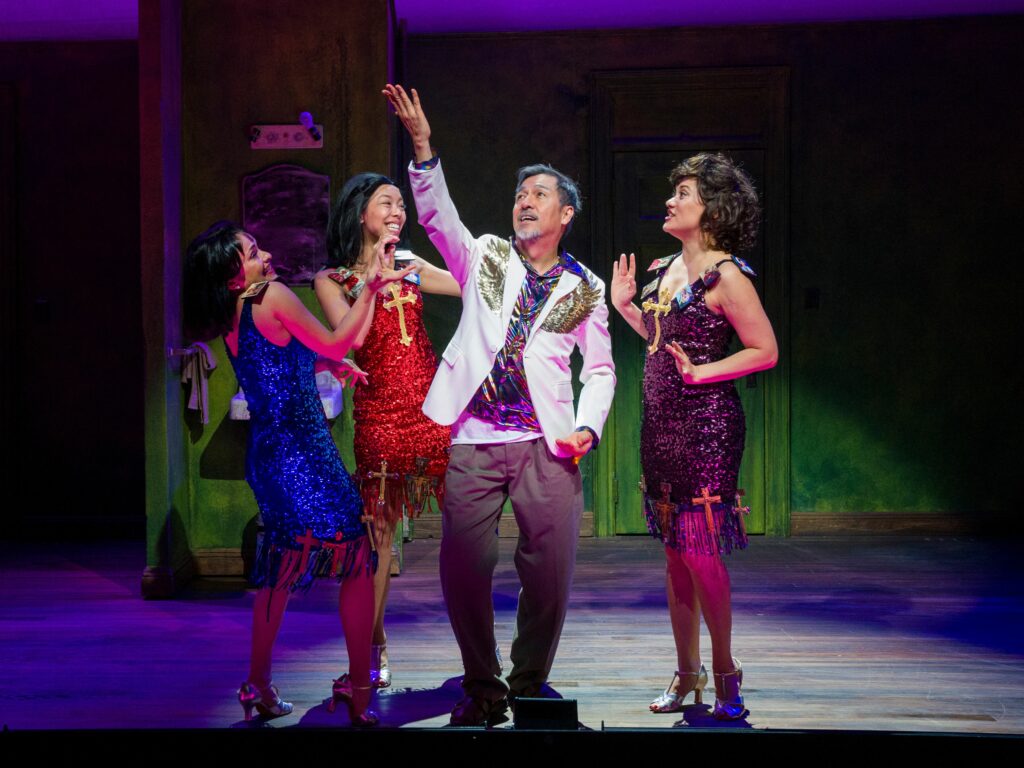
Photo by Richard Termine.
This is the thirtieth season for Ma-Yi, a company whose initial mission was the development and production of theatre about the Filipino American experience. It has since expanded its purview and become a theatre showcasing Asian American theatre artists broadly. Felix Starro is the first off-Broadway musical by, and I’m guessing about, Filipino Americans. As I watched the show, I appreciated moments when my fellow audience-members laughed at in-jokes I was outside of, and even though it meant I missed shades of meaning, I was so glad to at least perceive the multilingual texture of the script. Filipino, a standardized version of Tagalog, has the most loan-words of any language on earth, showing influence from English, Spanish, Arabic, Chinese, Japanese, Tamil, and even Nahuatl. The opening number, called “Prologue/Chismis”:
Oh my god, did you hear?
Dios ko ‘day, did you hear?
Felix Starro’s back in Frisco.
Hoy Manang,
Did you hear?
Susmaryosep, did you hear?
Felix Starro’s back in town.
“Chismis” is Filipino for gossip. The rest I won’t translate because it would destroy the tempo. And anyway, you get the point. Felix Starro is a phenomenon.
This post was written by the author in their personal capacity.The opinions expressed in this article are the author’s own and do not reflect the view of The Theatre Times, their staff or collaborators.
This post was written by Abigail Weil.
The views expressed here belong to the author and do not necessarily reflect our views and opinions.

